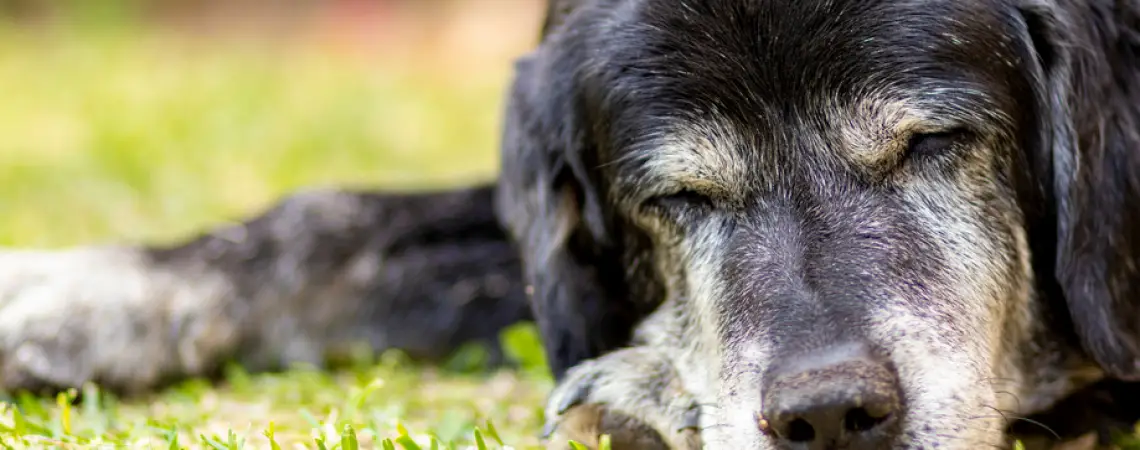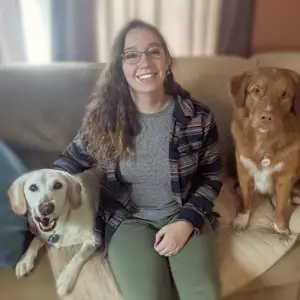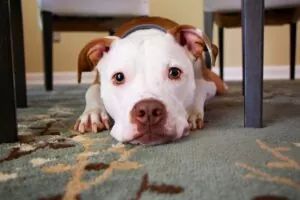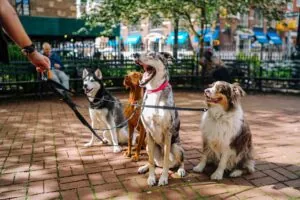It can be frightening when your older dog stops eating, especially if they have other health concerns or behavior changes at the same time. We want our dogs to live their longest and happiest lives with us, so changes in their behavior at an older age is always worrisome.
In this article we will look at reasons an old dog might not be eating, ways to get your older dog to eat, and when to be concerned and take your dog to the veterinarian.
What’s the reason my older dog won’t eat?
Sometimes, your older dog might be eating less simply because they don’t need as many calories. If your dog is maintaining a healthy weight, there’s no reason to worry about their decreasing appetite.
As many older dogs become arthritic and move less, they no longer need to eat as much to fulfill their caloric needs. Some dogs are just good at knowing this naturally!
In addition, dogs may eat less when they are in pain, nauseated, or stressed – all of which are more likely to happen in older dogs as they develop medical and behavior concerns associated with many aging canines.
Sometimes, our elderly dogs aren’t eating not because of a lack of appetite, but because it’s painful to do so. Dental problems are common in older dogs, and as their teeth decay it can cause them a lot of pain. They may want to eat – but have stopped eating to avoid the pain.
For this reason, good daily dental hygiene is important for your canine friends, and regular dental cleanings as well to remove tartar and plaque which can cause tooth decay and bad breath. Good dental care increases a dog’s quality of life in their later years.
However, if tooth loss has already happened, then you should try offering them a canned or a fresh dog food that is easier for them to chew.
When should I be concerned about my older dog’s lack of appetite?
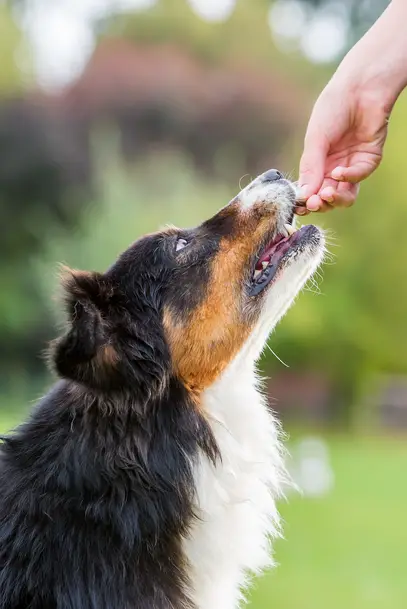
If your dog’s lack of appetite is sudden, especially if it’s accompanied by any other symptom of pain, distress, lethargy, or other symptoms of illnesses, you should first take your dog to the vet to rule out medical concerns.
There are a wide variety of medical problems that can lead to your dog not eating, since pain in general can cause a dog to avoid food. Your vet may be able to help if you’ve had no luck diagnosing the problem yourself.
If your dog has always been a picky eater, and their decline in appetite has been gradual, you’ll likely be OK to wait and see if you can get your dog to eat. However, if it’s been more than a day or two since your dog stopped eating, or if you see any other signs or symptoms of something not being right in your dog, you’ll still want to take them to the veterinarian.
At the vet clinic, they may perform a variety of tests to help determine the cause of your dog’s decline in appetite. These may include a variety of lab tests, such as blood work or fecal samples, in addition to imaging, such as an x-ray or ultrasound.
Your pet’s veterinarian will best be able to determine which tests are needed once they see your pet and take a thorough history of the problem, to rule out reasons for inappetence or to diagnose the cause.
How can I get my older dog to eat?
If you’ve determined that your dog is simply becoming a pickier eater in their old age, and your veterinarian hasn’t found a medical problem with your older dog, there are a few things you can try to help encourage your dog to eat.
Sometimes, your dog simply might want a change in their diet! Make sure to make these changes gradually, though, by mixing the old bag of food with the new. Trying a different flavor of kibble, or switching to a canned diet can help entice your dog to eat and renew their interest in food. If your dog refuses one flavor, don’t be afraid to try another! They have preferences too.
Many dogs also love wet food, especially because it’s easy to chew and eat for older dogs with poor dental health or those without many teeth left. Canned dog food also often has a stronger smell, and if your dog’s sense of smell has declined in their old age, this can help convince them to eat again.
We can recommend a fresh food like NomNomNow for older dogs. Fresh foods offer your dog something much tastier and more tempting than dry food, and it’s a good way to get an older, or sick dog to put on weight.
You can also try a combination, by mixing your dog’s kibble with wet food, or even with some chicken broth or gravy designed specifically to entice dogs to eat. The extra treat or additional smells will often convince a picky dog to give it a try.
In addition, if your older dog is eating less than normal, it’s important to make sure to feed them a food that provides plenty of calories in a smaller amount. If your dog has decided to only eat a small meal, it’s important they still get adequate nutrition!
While normally people try to avoid fatty foods for their dogs due to obesity, if you have a dog struggling to eat, those extra calories count! Don’t be afraid to add something tasty to make them eat and put on a few pounds.
Sometimes, offering their food throughout the day in smaller amounts can help as well, so they don’t have to eat it all at once. This is especially helpful if you offer your dog their food for a few minutes and then remove it, so your senior dog learns to eat when food is offered instead of always having access to food and becoming bored with it.
Finally, it’s OK to spoil your older dog with more treats now and then. They’ve earned it after their long life with you, and treats are often higher in calories than their normal food.
Just remember to seek veterinary care if your pet struggles with additional symptoms. A lack of appetite in an older dog can be due to such a wide variety of reasons that it’s often necessary to rule out a medical concern before you can try other measures to increase their appetite.
PS. Don’t forget to provide plenty of fresh drinking water to help them get their food down! This is especially true if you feed them a dry dog food.

